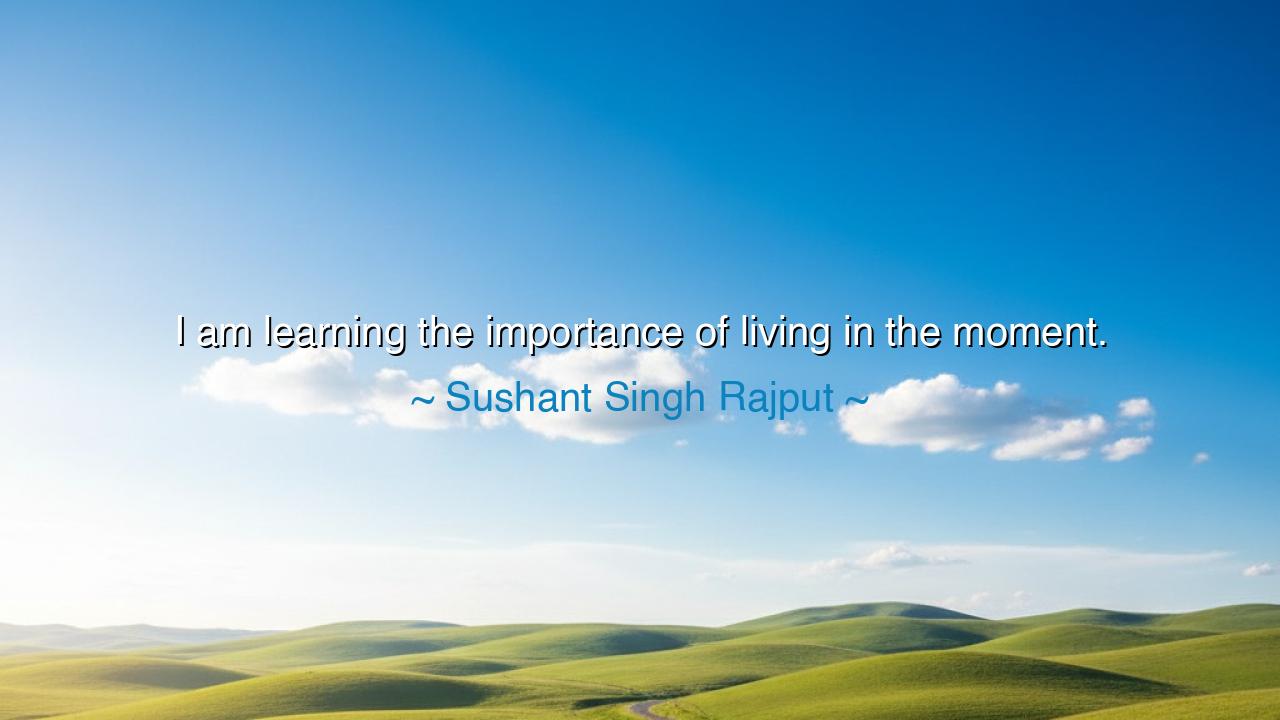
I am learning the importance of living in the moment.






“I am learning the importance of living in the moment.” — these words, spoken by Sushant Singh Rajput, are more than a reflection of a fleeting thought; they are the quiet wisdom of a soul awakening to the truth of life. In them, we hear the voice of a seeker — one who, having tasted success and ambition, began to look beyond them, to search for something deeper, something eternal. His words are simple, yet their meaning is profound: that life does not exist in the past we regret, nor in the future we chase, but in the present moment — that fragile, sacred space where the soul truly breathes.
In this short statement, Sushant reveals a journey of self-realization — “I am learning,” he says, not “I have learned.” This is the humility of one who knows that presence is a lifelong practice, not a possession. He was a man of science and art, reason and imagination, a student of the cosmos who still wrestled with the mysteries of being human. To “live in the moment” is not an easy lesson; it demands the courage to release the past and the discipline to silence the noise of tomorrow. It is a rebellion against the restlessness of the modern world, a return to the stillness that lies at the center of all things.
The ancients understood this truth well. Lao Tzu, the sage of the Tao, taught that “If you are depressed, you are living in the past. If you are anxious, you are living in the future. If you are at peace, you are living in the present.” The wisdom of the East and West alike converges here — that peace is found only in presence. To live fully in the now is to awaken to the miracle of being alive. It is to see the sunrise as if for the first time, to hear music not as sound but as spirit, to breathe and know that each breath is a gift never to be repeated.
Yet to live in the moment does not mean to abandon responsibility or ambition. It means to act with awareness, to love without distraction, to work with purpose. When the mind dwells in the past, it is bound by regret; when it races toward the future, it is chained by anxiety. But in the present moment — the eternal now — both chains fall away, and the soul becomes free. Sushant’s words remind us that even amidst success, fame, or struggle, the only true joy comes not from what we achieve, but from how we experience each moment of our journey.
Consider the life of Leonardo da Vinci, who lived centuries before but embodied this same truth. He was a man of unending curiosity, who found wonder in everything — the flight of birds, the curve of a smile, the movement of water. For Leonardo, every moment was alive with discovery; every instant held the possibility of revelation. He lived not rushing toward completion, but savoring the act of creation itself. His life teaches us, as Sushant’s words do, that to live in the moment is to live deeply — to see not merely with the eyes, but with the soul.
This understanding is not reached through intellect alone. It is learned through experience, silence, and loss. Those who have walked through pain often discover the fragile beauty of the present, for suffering teaches that nothing is guaranteed — not tomorrow, not even the next breath. Perhaps Sushant, in his reflective wisdom, had glimpsed this truth: that life, so easily taken for granted, must be lived now — fully, sincerely, joyfully. The present moment is all we truly own, and to waste it in distraction is to lose the very essence of living.
Therefore, my children, learn from this teaching: be here, now. When you speak, truly listen. When you work, give your whole being to your craft. When you walk beneath the sky, notice its changing colors. When you love, love as though the world stands still. For life is not waiting beyond the horizon — it is unfolding beneath your feet, in this very breath, in this fleeting heartbeat.
Remember Sushant Singh Rajput’s words as a sacred reminder: “I am learning the importance of living in the moment.” Let them be your call to awaken. Seek not perfection, but presence. Let go of what has passed, and do not chase what has not yet come. The one who lives in the present lives beyond time — and finds in every moment not merely existence, but eternity itself.






AAdministratorAdministrator
Welcome, honored guests. Please leave a comment, we will respond soon